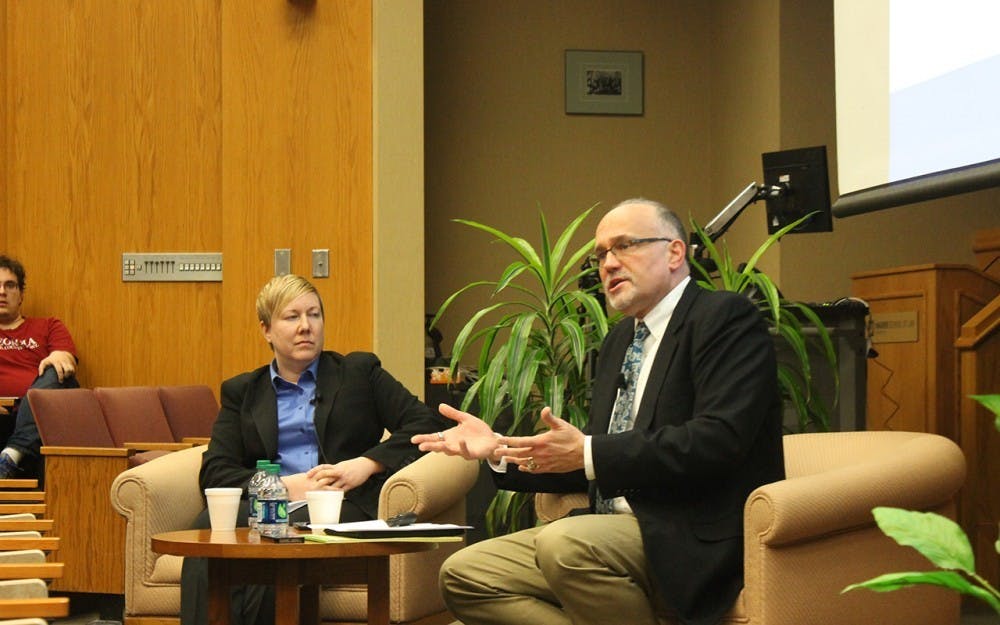Steve Sanders, tenured IU professor of law, published a piece Wednesday regarding IU’s presidential search process. The piece alleges the Board of Trustees possibly violated the Indiana Open Door Law, which states that meetings of government agencies must be held publicly with at least a 48-hour notice. Sanders said the process drifted away from the Board of Trustees’s commitment to give a voice to faculty and other stakeholders.
“In fact, the process that culminated in the Board of Trustees appointing IU’s 19th president was tortuous and flawed,” Sanders wrote in the piece published on Medium.
The Board of Trustees could legally hire whomever they want as president, however Sanders said universities have typically appointed a selection committee . Sanders said the search for university presidents and other large offices should ideally include faculty, alumni, students and other stakeholders.
“I don’t believe they went into this just assuming well the search committee is just for show,” Sanders said.
During the search for the new IU president the search committee presented the Board of Trustees with four final candidates. The committee was chaired by Melanie Walker, who unexpectedly died in August, Sanders said the board found some shortcomings with each candidate and ultimately took over the search themselves.
Sanders said that in order for the process to be meaningful the Board of Trustees should have chosen from those four people.
He said the board was beginning to get nervous they would not have a successful search by July 1, when former president Michael McRobbie was set to retire.
The board then approached McRobbie and asked him to stay on for additional six months, if necessary, agreeing to pay him approximately $582,000, according to a letter from the Board of Trustees.
The trustees then decided they would still honor their agreement and continue to pay him, per Sander’s research, after they hired Whitten.
This agreement between McRobbie and the trustees was not voted on publicly, so Sanders alleges that the Indiana Open Door Law was violated.
Sanders said by hiring externally, the university is losing institutional knowledge, especially with the number of major vacancies, such as vice presidents and provost, President Whitten will have to fill without this knowledge.
IU spokesperson Chuck Carney said Whitten was enthusiastically chosen but was not able to comment further when asked about the transparency behind the hiring of President Whitten.
“With the privacy of those involved in the search in mind, the trustees will not comment further on the search beyond the fact that Pamela Whitten was unanimously and enthusiastically chosen by IU’s Board of Trustees,” Carney wrote in an email to the Indiana Daily Student.
The Board of Trustees had to look for new candidates after rejecting the first four finalists in February, Sanders said.
Going into the search committee, committee members were forced to sign a nondisclosure agreement. Sanders said a certain degree of confidentiality is necessary for search committees, but he believes the NDA was used as a form of intimidation.
“I think it’s anti-collegial to treat someone, to treat a faculty member or an alumnus like that who essentially tried to intimidate them, which I think was the main purpose of the NDA,” Sanders said.
Sanders came to IU as a freshman and has since had an immense interest in the university. He said due to his interest in IU, he decided to take on this project over the summer after some rumors began circulating over the hiring process of Whitten.
Sanders said he wrote the piece with no motive but hopes it serves as a lesson for future presidential searches.
Sanders received notice Sept. 29 from the university that someone hired an Indianapolis law firm to file a request under the Indiana Access to Public Records Act requesting his emails, according to the piece written by Sanders.
Sanders claimed he gave IU general counsel Jackie Simmons two opportunities to state whether the law firm is working for IU, saying that on both attempts she did not respond. Sanders said he also reached out to Carney and Rebecca Carl, interim vice president for communications, with neither commenting.
“If it is IU, it would be a stunning attempt to chill a faculty member’s First Amendment rights and intimidate him into keeping silent about things the university knows will be controversial,” Sanders said in his piece.




